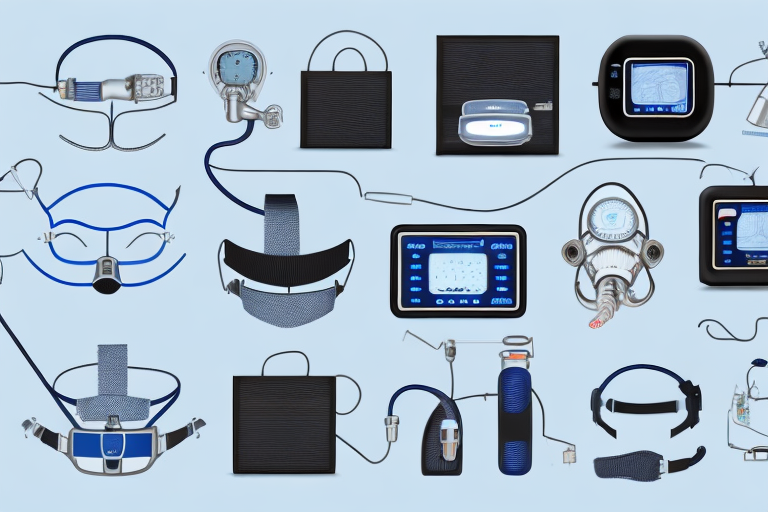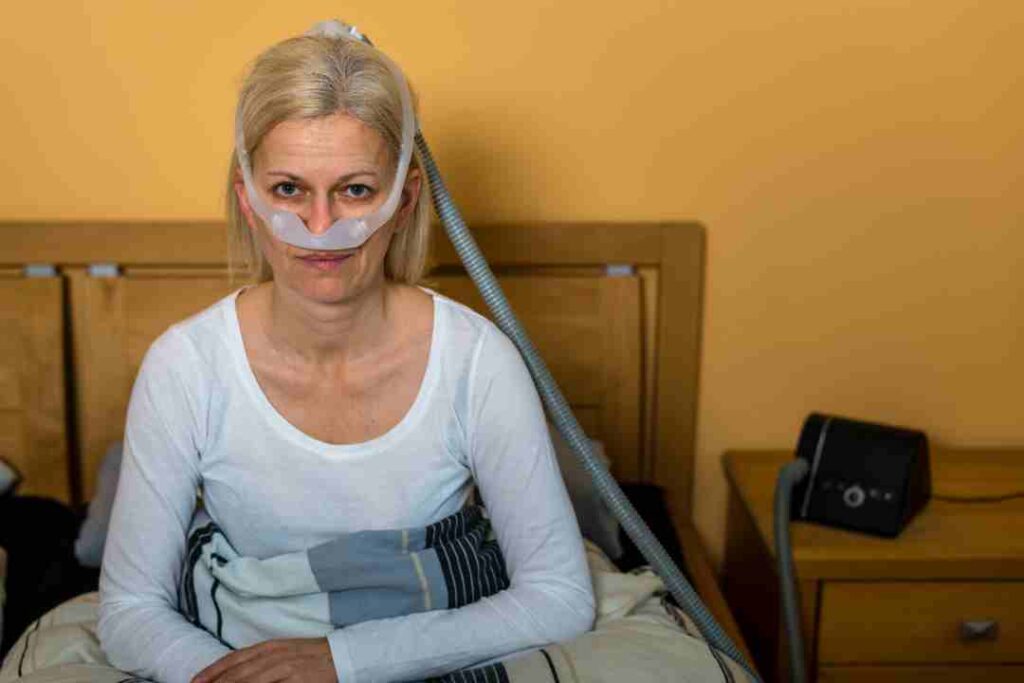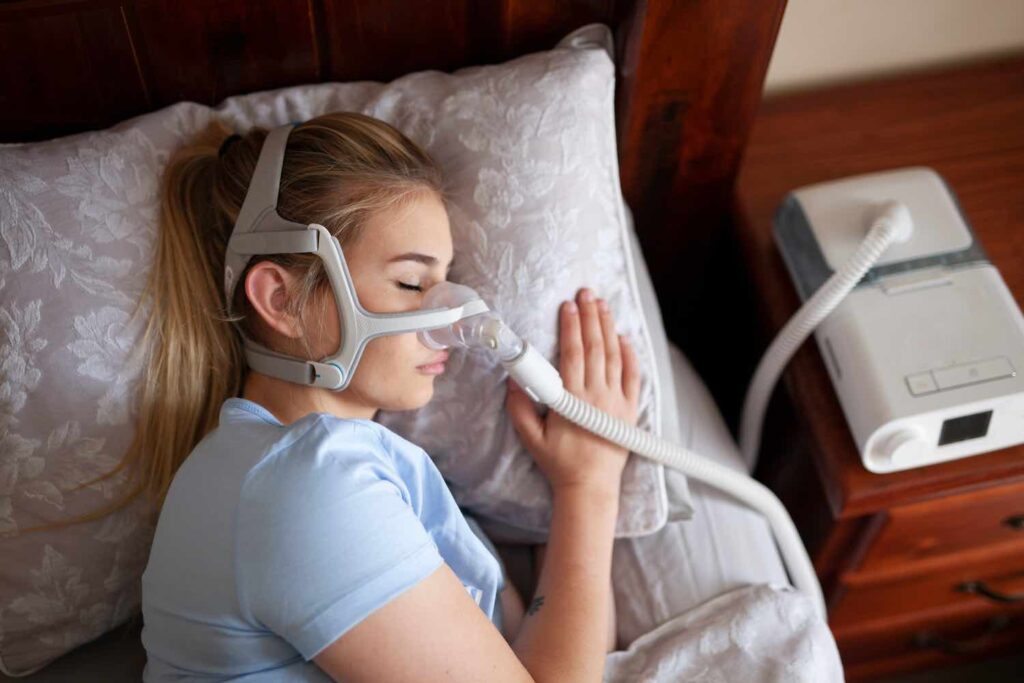In the world of sleep therapy, CPAP machines play a crucial role in helping individuals overcome sleep apnea and achieve a restful night’s sleep. These machines are designed to provide a steady flow of pressurized air, which helps to keep the airway open during sleep. If you’re new to CPAP machines or considering upgrading your current model, it’s essential to understand the basics and explore the various features available.
Understanding the Basics of CPAP Machines
A CPAP machine, short for Continuous Positive Airway Pressure machine, is a medical device that delivers a constant and steady stream of pressurized air to the user’s airway. It consists of three main components: the machine itself, a mask that covers the nose and/or mouth, and tubing that connects the mask to the machine. The pressurized air creates a cushion of continuous pressure, preventing the collapse of the airway during sleep and ensuring a continuous supply of oxygen.
When it comes to treating sleep apnea, CPAP machines play a crucial role. Sleep apnea is a sleep disorder characterized by repeated interruptions in breathing during sleep. These interruptions, known as apnea episodes, can occur due to the relaxation of the muscles in the throat, leading to a partial or complete blockage of the airway. This obstruction can result in loud snoring, gasping for air, and fragmented sleep.
A CPAP machine is a non-invasive treatment option commonly prescribed for those with obstructive sleep apnea. It functions by providing a constant flow of air pressure through a mask worn over the nose and/or mouth. This air pressure helps to keep the airway open, preventing interruptions in breathing and reducing the occurrence of apnea episodes during sleep. Learn more about selecting the right CPAP machine for effective treatment.

What is a CPAP Machine?
A CPAP machine is a device that works by delivering a continuous flow of pressurized air to the user’s airway. This pressurized air acts as a splint, keeping the airway open and allowing for uninterrupted breathing during sleep. The machine itself consists of a motor that generates the air pressure, a humidifier that adds moisture to the air, and controls that allow the user to adjust the settings according to their needs.
The mask, an essential component of the CPAP machine, comes in various styles and sizes to accommodate different preferences and facial structures. Some masks cover only the nose, while others cover both the nose and mouth. The choice of mask depends on the individual’s comfort and the severity of their sleep apnea. The tubing connects the mask to the machine, allowing the pressurized air to flow directly into the airway.
The Importance of CPAP Machines in Sleep Therapy
Sleep apnea is a common sleep disorder that can have serious health consequences if left untreated. CPAP machines are a cornerstone of sleep therapy because they effectively treat the root cause of sleep apnea – the obstruction of the airway. By using a CPAP machine consistently, individuals with sleep apnea can experience significant improvements in their quality of sleep, daytime alertness, and overall health.
Consistent use of a CPAP machine can help reduce the frequency and severity of apnea episodes, allowing individuals to achieve restful and uninterrupted sleep. This, in turn, can lead to improved cognitive function, increased energy levels, and enhanced mood. Additionally, CPAP therapy has been shown to lower the risk of cardiovascular problems, such as high blood pressure, heart disease, and stroke, which are commonly associated with untreated sleep apnea.
Furthermore, CPAP machines with built-in humidifiers can help alleviate common side effects of therapy, such as dryness and congestion in the nasal passages. The humidifier adds moisture to the pressurized air, reducing discomfort and making the therapy more tolerable for users.
In conclusion, CPAP machines are an essential tool in the treatment of sleep apnea. By delivering a continuous flow of pressurized air, these devices help keep the airway open, allowing for uninterrupted breathing during sleep. Consistent use of a CPAP machine can lead to significant improvements in sleep quality, daytime alertness, and overall health. If you suspect you have sleep apnea, it is important to consult with a healthcare professional who can evaluate your symptoms and recommend the appropriate treatment, which may include the use of a CPAP machine.
Exploring the Different Types of CPAP Machines
Not all CPAP machines are created equal. There are several types of CPAP machines available, each with unique features and advantages. Understanding the different options can help you choose the one that best suits your needs.
Auto-Adjusting CPAP Machines
Auto-adjusting CPAP machines, also known as APAP machines, continually monitor your breathing patterns and automatically adjust the airflow pressure to provide the minimum amount of pressure required. These machines are ideal for individuals whose pressure needs vary throughout the night or for those who find fixed pressure uncomfortable.
With their advanced technology, auto-adjusting CPAP machines can detect changes in your breathing patterns and adjust the pressure accordingly. This means that if you experience a blockage or obstruction in your airway, the machine can quickly respond by increasing the pressure to ensure a continuous flow of air. On the other hand, if your breathing becomes more relaxed and steady, the machine can decrease the pressure to provide a more comfortable experience.
Furthermore, these machines often come with additional features such as heated humidifiers and data tracking capabilities. The heated humidifier helps to prevent dryness and irritation in your airways, while the data tracking feature allows you and your healthcare provider to monitor your sleep patterns and make any necessary adjustments to your treatment plan. Visit https://embracehealingcancer.com/how-to-pick-the-best-cpap-machine-battery-solutions/ to read about How to Pick the Best CPAP Machine Battery Solutions.
Bi-Level CPAP Machines
Bi-level CPAP machines, also known as BiPAP machines, offer two different air pressure settings: a higher pressure for inhalation and a lower pressure for exhalation. This feature makes the machine more comfortable for individuals who require higher pressure levels or have trouble exhaling against the continuous pressure of a traditional CPAP machine.
For individuals with certain respiratory conditions, such as chronic obstructive pulmonary disease (COPD), BiPAP machines can be particularly beneficial. The higher pressure during inhalation helps to open up the airways and improve oxygenation, while the lower pressure during exhalation reduces the feeling of resistance and allows for easier breathing.
In addition to the dual pressure settings, BiPAP machines often come with other customizable features. These may include adjustable ramp times, which gradually increase the pressure to the prescribed level, and comfort settings, such as pressure relief technology, which reduces the pressure during exhalation to enhance comfort and compliance.
Travel CPAP Machines
Travel CPAP machines are compact, lightweight, and designed for portability. They are perfect for individuals who frequently travel or need to use their CPAP machine outside of their home. Despite their smaller size, travel CPAP machines offer the same therapeutic benefits as standard CPAP machines.
These machines are specifically designed to be easily transported and used in various settings. They often come with travel-friendly features such as universal power adapters, battery options, and travel cases. This allows you to use your CPAP machine even when you are away from home, ensuring consistent and effective treatment for your sleep apnea.
Furthermore, travel CPAP machines are engineered to be quiet and discreet, minimizing noise disruptions for both you and your travel companions. This makes it easier to use your CPAP machine in shared spaces, such as hotel rooms or airplanes, without causing any discomfort or inconvenience.
Despite their smaller size, travel CPAP machines still offer a wide range of features and settings to customize your therapy. These may include adjustable pressure settings, mask fit detection, and data recording capabilities, allowing you to monitor your progress and ensure optimal treatment even while on the go.
Key Features of CPAP Machines
CPAP machines come equipped with various features aimed at enhancing comfort and ease of use. Understanding these key features can help you select a CPAP machine that meets your specific needs.
Humidification Features
Many CPAP machines offer built-in humidification features to prevent dryness and irritation in the nose, throat, and mouth. These features provide moisture to the airflow, ensuring a more comfortable sleep experience.
Humidification features in CPAP machines work by adding moisture to the air that is delivered through the mask. This helps to prevent dryness and discomfort that can occur when using a CPAP machine. The added moisture can also help to reduce nasal congestion and keep the airways clear, allowing for more effective treatment of sleep apnea.
Some CPAP machines have adjustable humidification settings, allowing users to customize the level of moisture based on their individual preferences. This can be particularly beneficial for individuals who live in dry climates or those who experience dryness and irritation while using a CPAP machine.
Pressure Relief Features
Pressure relief features allow the machine to reduce the air pressure during exhalation, providing a more comfortable breathing experience. These features can help alleviate feelings of pressure or exhaling against a continuous airflow.
When using a CPAP machine, the continuous airflow can sometimes create a sensation of pressure, especially during exhalation. Pressure relief features in CPAP machines help to address this issue by automatically adjusting the air pressure during exhalation. This allows for a more natural breathing pattern and can enhance comfort during sleep.
Some CPAP machines offer different levels of pressure relief, allowing users to choose the setting that works best for them. This flexibility ensures that individuals can find the right balance between effective treatment and comfort.

Data Recording Features
CPAP machines with data recording features track various sleep metrics such as apnea events, mask leakages, and usage data. This data can be helpful for both users and healthcare professionals to assess the effectiveness of treatment and make necessary adjustments.
Data recording features in CPAP machines provide valuable insights into the effectiveness of sleep apnea treatment. By tracking apnea events, which are periods of interrupted breathing, users can monitor the frequency and severity of their sleep apnea. This information can help healthcare professionals make informed decisions about adjusting the treatment plan.
In addition to apnea events, CPAP machines with data recording features also track mask leakages. This information is crucial as a proper seal between the mask and face is essential for effective treatment. By identifying and addressing mask leakages, users can ensure that they are receiving the full benefits of their CPAP therapy.
Usage data recorded by CPAP machines can provide insights into the adherence and compliance of users. This data can be used to monitor the usage of the machine and ensure that individuals are consistently using their CPAP therapy as prescribed. It can also help healthcare professionals identify any issues or challenges that users may be facing and provide appropriate support.
Overall, the data recording features in CPAP machines offer a comprehensive view of the effectiveness and usage of sleep apnea treatment. This information can empower users to take an active role in their therapy and make informed decisions about their sleep health.
Selecting the Right CPAP Machine for Your Needs
Choosing the right CPAP machine can significantly impact your sleep therapy experience. Consider the following factors when selecting a CPAP machine:
Assessing Your Specific Sleep Therapy Needs
Before purchasing a CPAP machine, consult with your healthcare provider to determine the ideal air pressure needs and any specific requirements based on your sleep apnea diagnosis. This will ensure that you select a machine that meets your individual needs.
Considering the Noise Level and Size of the Machine
CPAP machines vary in terms of noise levels and size. If noise sensitivity is a concern, opt for a machine with whisper-quiet operation. Similarly, consider the size and portability of the machine, especially if you plan to travel frequently.
Understanding the Cost and Insurance Coverage
Lastly, consider the cost of the machine and whether it is covered by your insurance provider. CPAP machines can vary in price, and it is essential to understand the financial implications before making a purchase.
In conclusion, navigating through the various features of CPAP machines is crucial for individuals seeking effective sleep therapy for sleep apnea. Understanding the basics of CPAP machines, exploring different types, and considering key features will empower you to select the right machine that best suits your needs. Remember to consult with your healthcare provider for personalized guidance, ensuring optimal therapeutic benefits and a restful night’s sleep.

